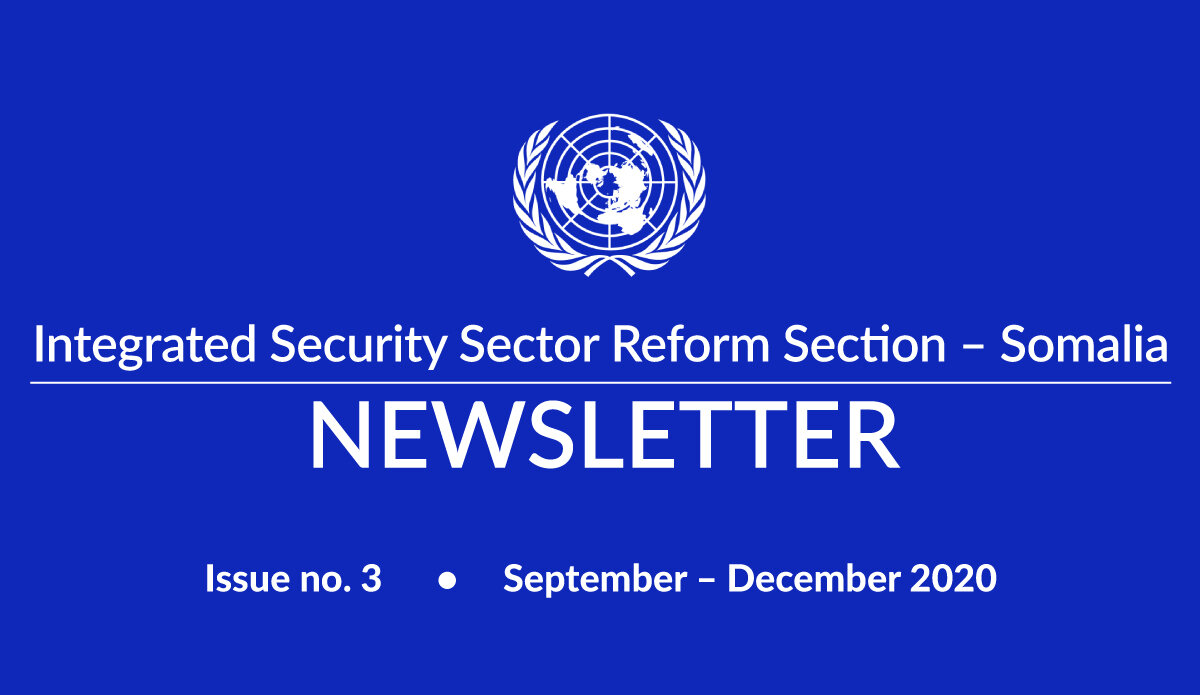NEWSLETTER HIGHLIGHTS
Security Sector Governance
The UNSOM-UNDP Joint Security Sector Governance Programme (JSSGP) is supporting the Federal Government of Somalia (FGS) and Federal Member States (FMS) security sector governance institutions to build their capacity and ensure that security sector reforms are effective and accountable within a framework of civilian control, rule of law and respect for human rights.
Training of Trainers
In September and October, the JSSGP supported the Ministry of Internal Security with the delivery of a six-day training of trainers’ workshop to 14 participants (F:5, M:9) from the ministry, the Office of the Prime Minister, the Ministry of Defence and the Benadir Regional Administration. The sessions, facilitated by the National Civil Service Institute, covered a variety of topics including leadership, management and facilitation skills. The training also counted with the support of UNSOM-UNDP I-SSR and Human Rights & Protection Group teams, who facilitated sessions on human rights standards, the UN human rights due diligence policy, child protection, and the Women, Peace and Security Agenda. Read more...
Extension of the Joint Security Sector Governance Programme
On 23 November and 22 December, the Office of the Prime Minister, UNSOM and UNDP co-chaired two JSSGP Steering Committee meetings. Representatives of the Federal Government Ministry of Internal Security and Ministry of Defence, Federal Member States’ Ministries of Security, Regional Security Offices, Sweden, Sweden the UK endorsed a six-month extension of the JSSGP, which was set to come to an end on 31 December 2020. The JSSGP transition phase entails an enhanced programme management, a clear link between the programme objectives and real outcomes and foresees a better coordination between the FGS and the FMS security reforms, as well as a sustainability plan to transfer those who are in the JSSGP payroll to the government civil service. During the transition phase, a joint FGS-FMS-UN taskforce will design the second phase of the JSSGP. Read more...
Security and Justice Committee of the Comprehensive Approach to Security
On 1 December, Prime Minister Mohamed Hussein Roble convened a meeting of the Security and Justice Committee of the Comprehensive Approach to Security involving senior representatives from the Federal Government of Somalia, Federal Member States representatives, and international partners. The meeting demonstrated a clear intent by all parties to revitalise discussions on the political security nexus, and ensure appropriate strategic direction of the CAS Strand Committees, with key Mutual Accountability Framework 2021 commitments on Security & Justice also confirmed at the Somalia Partnership Forum on 7 December. The SJC agreed to meet on a quarterly basis in 2021, with FGS security and rule of law Ministries now leading the respective Strands, supported by international partners. Ministerial level CAS Strand meetings and a Force Generation Conference to confirm the transitional commitments and required resources to deliver security transition by end 2021 are planned to take place in early 2021. Read more...
Maritime Domain
Somalia Maritime Administration (SMA) Working Group monthly meetings, comprising members of the Ministry of Ports and Marine Transport and international partners (UNSOM/EUCAP/UNODC/IMO/WFP), were convened virtually from September to December. On 2 December, the newly appointed Deputy Minister of Ports and Marine Transport, H.E. Dr. Mahad Hassan Mohamed, chaired the SMA Working Group monthly meeting and highlighted, amongst a series of requirements, the need to develop a National Search and Rescue Plan, linked to Somalia’s declarations to MARPOL and SOLAS conventions. The monthly meetings have placed a strong focus on ship registration, with an updated draft regulation now developed and endorsed by IMO. All stakeholders have also agreed on the importance of the SMA declaring Initial Operational Capability in 2021. Read more...
DOALOS Institutional Capacity Building
The United Nations Division for Ocean Affairs and the Law of the Sea (DOALOS), with UNSOM and other international partners support, delivered a “Technical Training Programme in Ocean Affairs and the Law of the Sea for Maritime Law Enforcement Authorities”. A total of 33 maritime law enforcement authorities/officials from the FGS and FMS attended the 7-day course spread over 4 Weeks. This Technical Training Programme was funded through a UN Administered Trust Fund and further enhanced Somalia’s maritime governance capacity. At the closing event for the course on 9 December 2020, the Minister of Justice, the State Minister of Foreign Affairs, and the Director of the Office of the Special Envoy of the President for Horn of Africa, Red Sea and Gulf of Aden, provided closing remarks and stressed the value of the training programme towards the development of an effective legal and institutional framework for the governance of Somalia’s maritime zones. Read more...
Security Sector Governance
The UNSOM-UNDP Joint Security Sector Governance Programme (JSSGP) is supporting the Federal Government of Somalia (FGS) and Federal Member States (FMS) security sector governance institutions to build their capacity and ensure that security sector reforms are effective and accountable within a framework of civilian control, rule of law and respect for human rights.
In September and October, the JSSGP supported the Ministry of Internal Security with the delivery of a six-day training of trainers’ workshop to 14 participants (F:5, M:9) from the ministry, the Office of the Prime Minister, the Ministry of Defence and the Benadir Regional Administration. The sessions, facilitated by the National Civil Service Institute, covered a variety of topics including leadership, management and facilitation skills. The training also counted with the support of UNSOM-UNDP I-SSR and Human Rights & Protection Group teams, who facilitated sessions on human rights standards, the UN human rights due diligence policy, child protection, and the Women, Peace and Security Agenda.
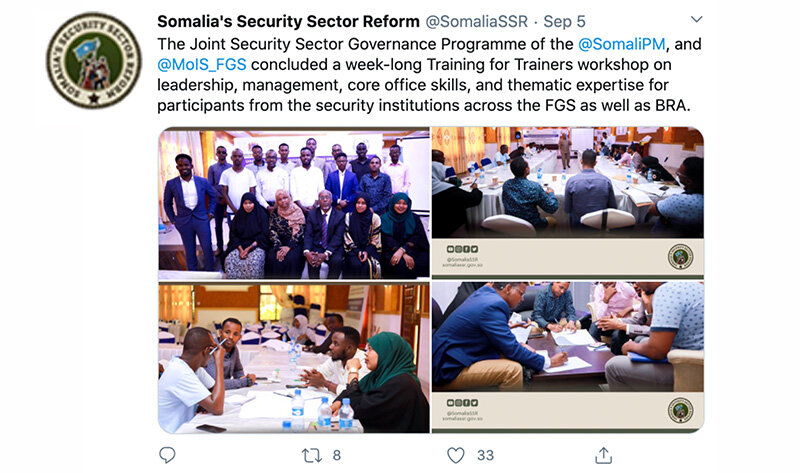
A similar training was delivered to 20 staff members (F:5, M:15) from the Office of the Prime Minister and to 36 staff members (F:7, M:29) from the Ministry of Defence. In November, the JSSGP supported the Ministry of Internal Security to organize a Training of Trainers workshop in Mogadishu with 15 participants (F:2, M:13) from the Ministries of Security of Hirshabelle, South West State, Jubbaland and Galmudug. During the six-day workshop, trainers from the National Civil Service Institute facilitated the sessions and provided expertise on a variety of topics including leadership, management and facilitation skills.
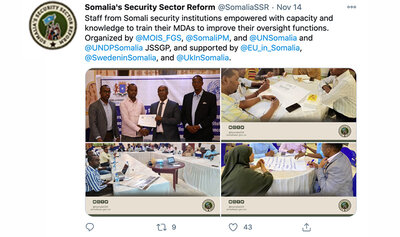
In December with the support of the JSSPG, the Ministry of Security & DDR of Puntland delivered a training to 61 staff (F:19, M:42) to assist the Ministry in improving its capacity to exercise oversight of its security services. The training covered security analysis, police-ministry relations, community policing, gender and security, financial management and accounting.
Extension of the Joint Security Sector Governance Programme
On 23 November and 22 December, the Office of the Prime Minister, UNSOM and UNDP co-chaired two JSSGP Steering Committee meetings. Representatives of the Federal Government Ministry of Internal Security and Ministry of Defence, Federal Member States’ Ministries of Security, Regional Security Offices, Sweden, Sweden the UK endorsed a six-month extension of the JSSGP, which was set to come to an end on 31 December 2020. The JSSGP transition phase entails an enhanced programme management, a clear link between the programme objectives and real outcomes and foresees a better coordination between the FGS and the FMS security reforms, as well as a sustainability plan to transfer those who are in the JSSGP payroll to the government civil service. During the transition phase, a joint FGS-FMS-UN taskforce will design the second phase of the JSSGP.
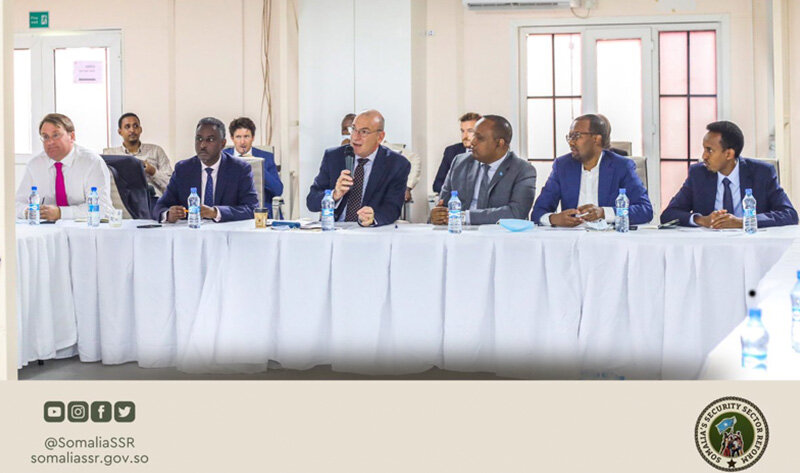
Security and Justice Committee of the Comprehensive Approach to Security
On 1 December, Prime Minister Mohamed Hussein Roble convened a meeting of the Security and Justice Committee of the Comprehensive Approach to Security involving senior representatives from the Federal Government of Somalia, Federal Member States representatives, and international partners. The meeting demonstrated a clear intent by all parties to revitalise discussions on the political security nexus, and ensure appropriate strategic direction of the CAS Strand Committees, with key Mutual Accountability Framework 2021 commitments on Security & Justice also confirmed at the Somalia Partnership Forum on 7 December. The SJC agreed to meet on a quarterly basis in 2021, with FGS security and rule of law Ministries now leading the respective Strands, supported by international partners. Ministerial level CAS Strand meetings and a Force Generation Conference to confirm the transitional commitments and required resources to deliver security transition by end 2021 are planned to take place in early 2021.
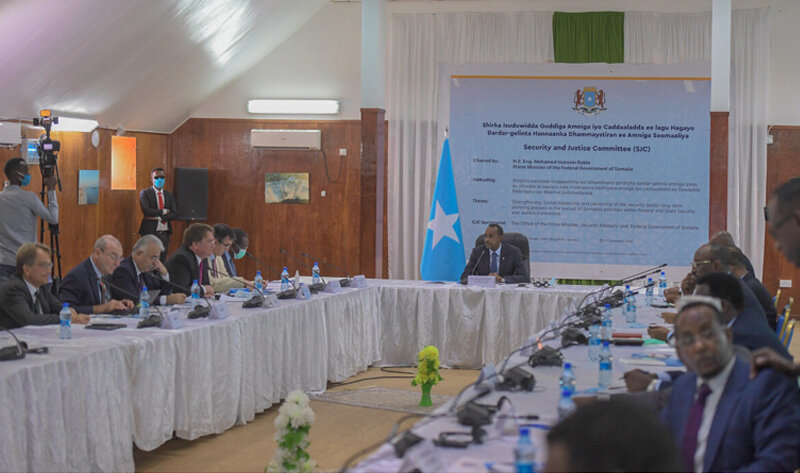
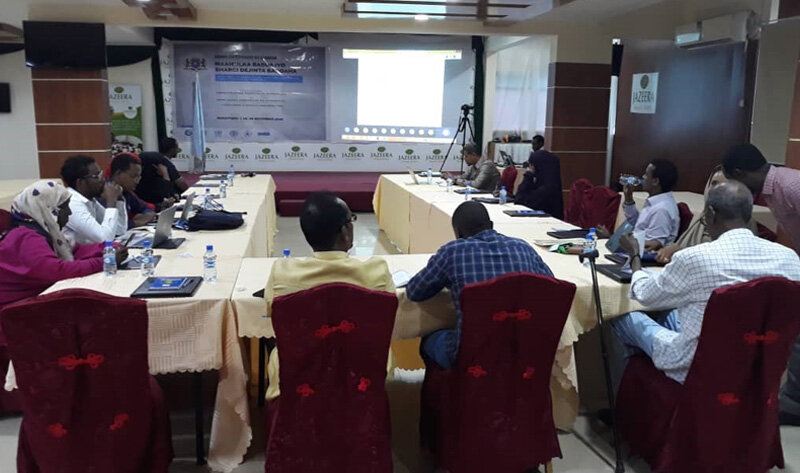
The Somalia Maritime Administration (SMA) has come a long way in strengthening the Maritime sector. UNSOM has been working closely with MPMT/SMA representatives by providing support and strategic guidance, training, and capacity building activities towards the full operationalization of the SMA to perform efficiently its mandate. UNSOM also carries out functions in supporting the functioning of the Secretariat of the SMA. The support is mainly focused on the 4 priorities identified by the SMA, namely: legal compliance, ship registration, crew certification and the establishment of a Maritime Rescue Coordination Centre (MRCC).
These four key points are fundamental to SMA achieving its Initial Operational Capability (IOC). Attaining IOC will enable SMA to effectively perform the responsibilities mandated by International maritime law and subsequent national regulations. Somalia Maritime Administration (SMA) Working Group monthly meetings, comprising members of the Ministry of Ports and Marine Transport and international partners (UNSOM/EUCAP/UNODC/IMO/WFP), were convened virtually from September to December and emphasized towards attaining the key four points as mentioned above.
On 2 December, the newly appointed Deputy Minister of Ports and Marine Transport, H.E. Dr. Mahad Hassan Mohamed, chaired the SMA Working Group monthly meeting and highlighted, amongst a series of requirements, the need to develop a National Search and Rescue Plan, linked to Somalia’s declarations to MARPOL and SOLAS conventions. The monthly meetings have placed a strong focus on ship registration, with an updated draft regulation now developed and endorsed by IMO. All stakeholders have also agreed on the importance of the SMA declaring Initial Operational Capability in 2021.
In support of Somalia’s effort to develop a sustainable, transparent and affordable long-term plan towards achieving synergies between maritime security and Blue Economy opportunities, UNSOM and EUCAP Somalia have expressed their willingness and commitment to provide support towards the domestication of the Shipping code and MARPOL and SOLAS conventions, including providing legal advice to develop legal frameworks and regulations to tackle illegal foreign fishing activity, the dumping of toxic wastes, and unregulated economic activity. These areas have been prioritized by the MPMT and SMA during SMA WG monthly meetings and will have a positive impact in Somalia’s commercial opportunities to exploit a globally strategic shipping route and rich fish stocks, increasing employment opportunities, thereby serving as a catalyst in securing Somalia’s coastline and developing the country’s Blue Economy, in line with the NDP9.
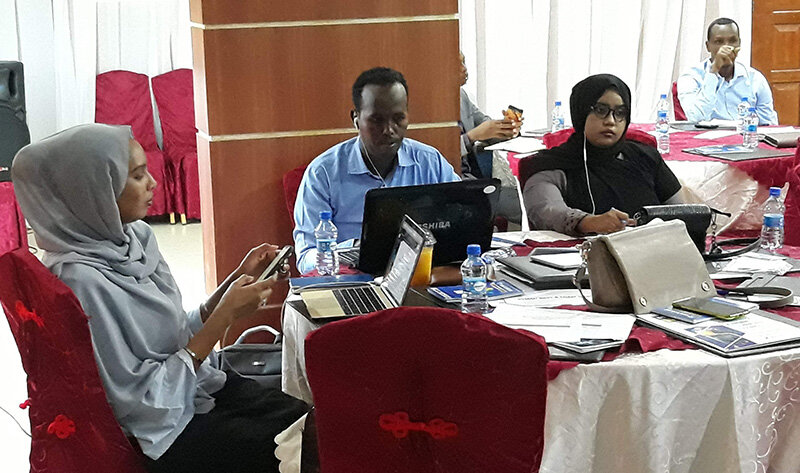
UNSOM supported the revitalisation of the National Maritime Coordination Committee (NMCC) under the auspices of Special Envoy of the President for Red Sea, Gulf of Aden, and Horn of Africa affairs. The NMCC is the highest decision-making body for Somalia on Maritime Matters. Encouragingly, two NMCC Technical Level meetings were convened on 3 September and 30 December 2020. These meetings were instrumental in establishing groundwork for the ministerial level meeting to be held later. Salient points covered in the NMCC technical meetings include, (i) the need for both FGS and FMS interaction to address security and blue economy capacity building. (ii) the need for linkages with international partners and the need for a new coordination body to be established for all maritime matters. (iii) Maritime directorate within the Office of the President to serve as the Secretariat for all the three entities i.e. NMCC Executive, NMCC technical and the International coordination bodies.
This is an encouraging strategic development and demonstrates a willingness to reconstitute the dialogue between sectorial interests, while allowing Somali maritime stakeholders to engage at both strategic and technical levels to better articulate collective objectives towards the development of Somalia’s maritime domain awareness, as well as increase focus of international assistance.
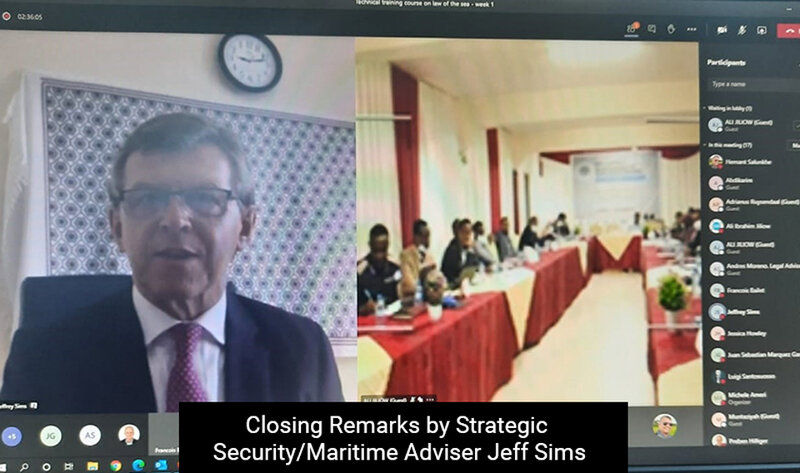
Somalia has the longest coastline on the African Continent, and borders one of the most important marine ecosystems in the Indian Ocean. The presence of a narrow physical continental shelf in this region along the western Indian Ocean coupled with an upwelling makes this area one of the most productive in the Indian Ocean, and an important breeding ground rich in marine resources, including many migratory fish species. Realizing the economic, social and environmental benefits that may arise from the conservation and sustainable use of Somalia’s marine resources is therefore a key contributor to Somalia’s National Development Plan. It further represents significant opportunities for tackling the underlying causes of piracy off the coast of Somalia, including through the provision of alternative livelihoods and economic opportunities, with the support assisting Somalia to put in-place an effective legal and institutional framework for improved maritime governance.
To that end, it is crucial that Somalia has in place an effective legal and institutional framework for maritime governance in conformity with the applicable international law. Not only will such framework help provide an enabling governance environment for the development of sustainable ocean economy in Somalia, but it will also contribute to tackling the underlying causes of piracy relating to lack of rule of law and ineffective State control.
To address the issue, an agreement has been reached between the Federal Government of Somalia and the United Nations to provide assistance to Somali officials to facilitate the development of an effective legal framework for the governance of Somalia’s maritime zones and the sustainable development of its resources to allow it to conform with the 1982 United Nations Convention on the Law of the Sea (UNCLOS) and related instruments, in furtherance of Somalia’s national interests and priorities. The United Nations Division for Ocean Affairs and the Law of the Sea, Office of Legal Affairs (DOALOS/OLA) and UNSOM lead the capacity building activities, supported by other international partners, including UNODC, IMO, FAO and WFP.
Towards fulfilment of the capacity building activity, United Nations Division for Ocean Affairs and the Law of the Sea (DOALOS), with UNSOM and other international partners support, delivered a “Technical Training Programme in Ocean Affairs and the Law of the Sea for Maritime Law Enforcement Authorities”. A total of 33 maritime law enforcement authorities/officials from the FGS and FMS attended the 7-day course spread over 4 Weeks. This Technical Training Programme was funded through a UN Administered Trust Fund and further enhanced Somalia’s maritime governance capacity. At the closing event for the course on 9 December 2020, the Minister of Justice, the State Minister of Foreign Affairs, and the Director of the Office of the Special Envoy of the President for Horn of Africa, Red Sea and Gulf of Aden, provided closing remarks
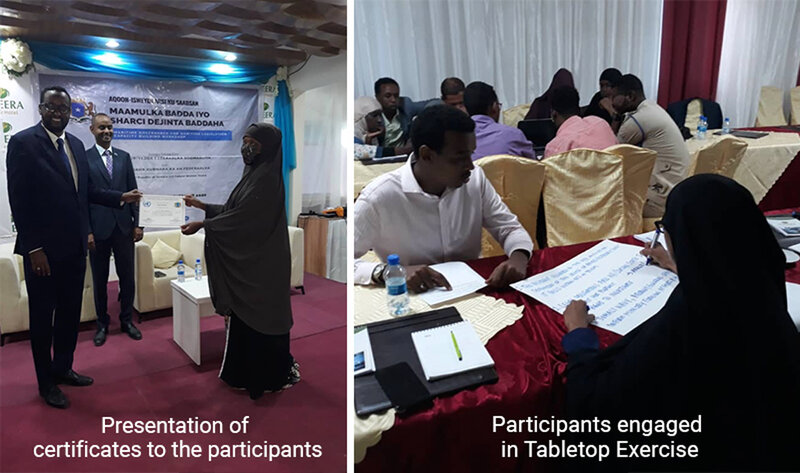
 UN
UN
